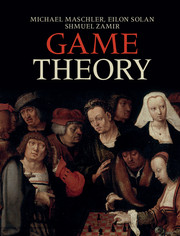Book contents
- Frontmatter
- Contents
- Acknowledgments
- Notations
- Introduction
- 1 The game of chess
- 2 Utility theory
- 3 Extensive-form games
- 4 Strategic-form games
- 5 Mixed strategies
- 6 Behavior strategies and Kuhn's Theorem
- 7 Equilibrium refinements
- 8 Correlated equilibria
- 9 Games with incomplete information and common priors
- 10 Games with incomplete information: the general model
- 11 The universal belief space
- 12 Auctions
- 13 Repeated games
- 14 Repeated games with vector payoffs
- 15 Bargaining games
- 16 Coalitional games with transferable utility
- 17 The core
- 18 The Shapley value
- 19 The bargaining set
- 20 The nucleolus
- 21 Social choice
- 22 Stable matching
- 23 Appendices
- References
- Index
11 - The universal belief space
- Frontmatter
- Contents
- Acknowledgments
- Notations
- Introduction
- 1 The game of chess
- 2 Utility theory
- 3 Extensive-form games
- 4 Strategic-form games
- 5 Mixed strategies
- 6 Behavior strategies and Kuhn's Theorem
- 7 Equilibrium refinements
- 8 Correlated equilibria
- 9 Games with incomplete information and common priors
- 10 Games with incomplete information: the general model
- 11 The universal belief space
- 12 Auctions
- 13 Repeated games
- 14 Repeated games with vector payoffs
- 15 Bargaining games
- 16 Coalitional games with transferable utility
- 17 The core
- 18 The Shapley value
- 19 The bargaining set
- 20 The nucleolus
- 21 Social choice
- 22 Stable matching
- 23 Appendices
- References
- Index
Summary
Chapter summary
In this chapter we construct the universal belief space, which is a belief space that contains all possible situations of incomplete information of a given set of players over a certain set of states of nature. The construction is carried out in a straightforward way. Starting from a given set of states of nature S and a set of players N we construct, step by step, the space of all possible hierarchies of beliefs of the players in N. The space of all possible hierarchies of beliefs of each player is proved to be a well-defined compact set T, called the universal type space. It is then proved that a type of a player is a joint probability distribution over the set S and the types of the other players. Finally, the universal belief space Ω is defined as the Cartesian product of S with n copies of T; that is, an element of Ω, called state of the world, consists of a state of nature and a list of types, one for each player.
Chapters 9 and 10 focused on models of incomplete information and their properties. A belief space Π with a set of players N on a set of states of nature S, is given by a set of states of the world Y, and, for each state of the world ωϵ Y, a corresponding state of nature s(ω) ϵ S and a belief πi (ω) ϵ Δ(Y) for each player i ϵ N.
- Type
- Chapter
- Information
- Game Theory , pp. 440 - 460Publisher: Cambridge University PressPrint publication year: 2013



